|
|
|
Sort Order |
|
|
|
Items / Page
|
|
|
|
|
|
|
| Srl | Item |
| 1 |
ID:
184142
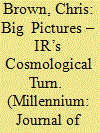

|
|
|
| 2 |
ID:
184136
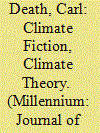

|
|
|
|
|
| Summary/Abstract |
The international politics of climate change invokes the imagination of various potential global futures, ranging from techno-optimist visions of ecological modernisation to apocalyptic nightmares of climate chaos. This article argues that most dominant framings of the future in climate policy imaginaries tend to be depoliticised and linear visions of universal, homogenous time, with little spatio-temporal or ecological plurality. This article aims to convince IR scholars of climate politics that Africanfuturist climate fiction novels can contribute to the decolonisation of climate politics through radically different socio-climatic imaginaries to those that dominate mainstream imaginations of climate futures. The Africanfuturist climate fiction novels of authors such as Nnedi Okorafor, Lauren Beukes and Doris Lessing imagine different spaces, temporalities, ecologies and politics. Reading them as climate theory, they offer the possibility of a more decolonised climate politics, in which issues of land and climate justice, loss and damage, extractive political economies and the racialised and gendered violence of capitalism are central.
|
|
|
|
|
|
|
|
|
|
|
|
|
|
|
|
| 3 |
ID:
184138
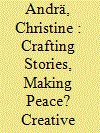

|
|
|
|
|
| Summary/Abstract |
This article examines the analytical and political potentials of creative methods for peace research. Specifically, the article argues that creative methods can textile, i.e. render material and irregularly textured, (research on) post-conflict politics. Grounded in a collaborative research project with former combatants in Colombia, the article takes this project’s methods – narrative practice, textile-making, and a travelling exhibition – as examples to demonstrate how creative methods’ element of making contributes to the development of post-conflict subjectivities and relationships. Casting the data generated by creative methods as crafted stories, the article also shows how in these stories, semantic meaning becomes entangled with material traces of emotional, affective, and embodied experiences of violence and its aftermath, effecting a shift in the post-conflict distribution of the sensible. By exploring creative methods’ capacity for textiling peace (research), the article contributes to research on creativity, the arts, and peace and on the post-conflict trajectories of former combatants.
|
|
|
|
|
|
|
|
|
|
|
|
|
|
|
|
| 4 |
ID:
184131
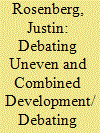

|
|
|
|
|
| Summary/Abstract |
This forum arises from an online event on the theory of uneven and combined development (UCD). Following an introduction which proposes a ‘special affinity’ between UCD and International Relations (IR), four presenters at that event discuss their ‘view from outside’ UCD, including perspectives from Global Historical Sociology, Realism, Decolonial theory and Gramscian Marxism. Meanwhile four members of the audience add their views on UCD and disciplinarity, the need for pluralism in UCD methodology, UCD and ‘whiteness’, and its potential contribution to ecological theory and practice.
|
|
|
|
|
|
|
|
|
|
|
|
|
|
|
|
| 5 |
ID:
184133
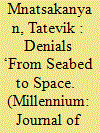

|
|
|
|
|
| Summary/Abstract |
Despite critiques of denials broadly underlying Critical International Relations deconstructions of state, security and subjectivity, there is little explicit exploration of the ontological status of denial, and how denials operate in the politics of (in)security. Animated by the question, why and how web of actors and interests traversing the public and private spheres involved in the provision of security endure despite long-running critique, this article problematises = denials. An explicit theorisation of denial needs to be put centre stage in the study of security. Drawing on Dillon’s theorisation of the unstable duality of (in)security and synthesising it with a Deleuze and Guattarian assemblage approach, it theorises denial in two forms – denial of complicity and denial of the impossibility of security – as ontologically necessary for the politics of (in)security; then proposes that we scrutinise and expose assemblages of (in)security. These assemblages form, endure and expand, by thriving on denials of the impossibility of security and its attendant complicities; forming symbioses of denial traversing the public-private realms. Assemblages of (in)security adapt, expand, and propagate new technologies of (in)security, often ironically by responding to demands from critique. Without an assemblage-based thinking, we are methodologically ill-equipped to trace, expose and critique the politics of (in)security, without unwittingly partaking in denials sustaining it.
|
|
|
|
|
|
|
|
|
|
|
|
|
|
|
|
| 6 |
ID:
184141
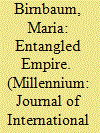

|
|
|
|
|
| Summary/Abstract |
In this article I trace the transnational history of Pakistan and Israel, focusing on the global politics of religion entailed therein. I study the often-overlooked intra-imperial dynamics and the ways in which these intersected with the colonial and post-colonial sociology of knowledge, the politics of cultural diversity and the changing international order. I illustrate how the census and the enumeration of minorities, the claim to political representation, and the transition from ‘minority’ to ‘nation’ shaped that which could be recognised as religious difference as well as the states defined by it. I thereby show how the colonial governmental logic that structured the minority politics of the British Indian Muslims and the Palestinian Jews both limited and enabled the claims to the nations and the states that came to replace them. The case study focuses on two key individuals in the history of the Indian and Palestine partition, and the Pakistani and Israeli independence that followed, Reginald Coupland and Muhammad Zafarullah Khan. I ask how they, the institutions they represented, and the ideas they carried, circulated and influenced changed over the final decade before independence. In the final part of the article, I argue that claims for the recognition of religion in international relations (IR) are not separate from these forms of colonial epistemological politics but are intimately connected to them. By studying the global, entangled politics of religion we can begin to understand the costs of its recognition.
|
|
|
|
|
|
|
|
|
|
|
|
|
|
|
|
| 7 |
ID:
184140
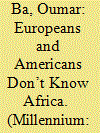

|
|
|
|
|
| Summary/Abstract |
Bombing begets pedagogy’, Naeem Inayatullah writes, reflecting on the sudden American thirst for knowledge on the Afghan people and its cultural landscape, soon after the US started its 2001 bombing campaign.2 The African predicament too, is a fertile ground for exploration, study, translation, and explanation. But above all, it is a site for life stories waiting to be tapped, taped, filled into survey questionnaires, and ran through regression tables. The aftermath of mass atrocities or deadly elections, an influx of Chinese loans, and military coups against inept satraps3 all provide ample opportunities for Europe and American scholars to flock into the continent.
|
|
|
|
|
|
|
|
|
|
|
|
|
|
|
|
| 8 |
ID:
184137
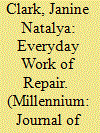

|
|
|
|
|
| Summary/Abstract |
This interdisciplinary article uses what Das has termed ‘the everyday work of repair’ as a framework for thinking about resilience. It is not the first to discuss resilience and the everyday. What is novel is the context in which it does so. Extant scholarship on conflict-related sexual violence has largely overlooked the concept of resilience. Addressing this gap, the article draws on semi-structured interviews with victims-/survivors of conflict-related sexual violence in Bosnia and Herzegovina (BiH), Colombia and Uganda to examine what everyday resilience ‘looks’ like and how it is expressed within and across highly diverse social ecologies. In so doing, it reflects on what everyday resilience means for transitional justice, through a particular focus on hybridity. It introduces the term ‘facilitative hybridity’, to underscore the need for transitional justice processes to give greater attention to the social ecologies that can crucially support and enable the everyday work of repair and everyday resilience.
|
|
|
|
|
|
|
|
|
|
|
|
|
|
|
|
| 9 |
ID:
184135
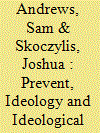

|
|
|
|
|
| Summary/Abstract |
The work of Louis Althusser is well regarded in the study of ideology, having been used to analyse the material basis for ideology, and challenging the idea that ideology is simply a product of the mind. Recent advances in counterterrorism have seen many states adopting preventative programmes which are non-violent, and nominally voluntary, attempting to deradicalise or steer subjects away from radical ideologies, in an attempt to stem terrorist recruits. Many of these programmes claim not to be ideological. Prevent, which is the UK’s preventative counterterrorism programme, claims not to be ideological, but rather only concerned with stopping extremist ideologies. Using Althusser’s Ideological State Apparatus (ISA) framework, this article explores the ideological and material basis of Prevent, arguing that while Prevent assures us of its non-ideological nature, at its core is a programme that is part of the reproductive ideological apparatus of the state.
|
|
|
|
|
|
|
|
|
|
|
|
|
|
|
|
| 10 |
ID:
184132
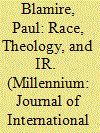

|
|
|
|
|
| Summary/Abstract |
This article introduces the work of black liberation theologian James H. Cone into the mutual silence between the study of race and the study of Christian theology in IR. Despite the theological roots of the colonial-modern idea of race, these areas of study in IR have mostly been approached separately. Cone’s thought responds to the complicity of white supremacy and Christianity, whilst theorising a theology of black liberation. It is thus witness and testament to the redemptive potential of a theological frame, inviting us to think beyond secular reason. Cone’s thought raises important theological questions about universality, a central stake for IR discussions of Christian theology. This article identifies supersessionism, the idea that Christianity supersedes both Judaism, and any particularity (as a potentially universal salvific community), as a key notion in the enlightenment secularisation of theological thought, and the development of a racialised colonial modernity that modelled itself in part on Christianity’s longstanding anti-Semitism. This article opens an engagement with Cone’s work for discussions of both Christian theology and race in IR, pointing to the innermost doctrines of Christianity as a site of tension at which race thinking and Christianity are connected, and at which they might be de-linked.
|
|
|
|
|
|
|
|
|
|
|
|
|
|
|
|
| 11 |
ID:
184134
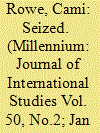

|
|
|
|
|
| Summary/Abstract |
This article examines representations of border security within public museums, through the example of the UK Border Force National Museum. It begins by discussing the way that international borders are theatrically experienced, and the parallel characteristics of museum spaces. I then suggest the value of performance autoethnography when analysing such phenomena, which arises from the ability to creatively situate personal experience alongside institutional scripts of border control. The article then presents a performance autoethnography that illustrates my experiences within the Border Force Museum. This provides new insights into the theatrical framing of the museum and its effect on visitor interpretations. The article demonstrates that the Border Force Museum replicates the theatricality of border control sites, and thus supports the ordering of bodies into insiders and outsiders; however, creative methods for knowledge production might offer a means of challenging existing border taxonomies, especially when personal experience is circulated through theatrical means.
|
|
|
|
|
|
|
|
|
|
|
|
|
|
|
|
| 12 |
ID:
184139
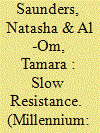

|
|
|
|
|
| Summary/Abstract |
In this article we seek to expand on the developing interest in Slow Violence and how it relates to immigration and asylum, by exploring how such violence is resisted. Following Foucault’s insight that in order to better understand power, it helps to study resistance to it, we draw on original research into acts of protest by refugees and asylum seekers in Scotland, and connect this to existing research on experiences of and resistance to the UK asylum system. In so doing we offer ‘Slow Resistance’ as a potentially useful concept with which to understand resistance not just to a particular configuration of power relations, but to a particular form of violence. The conceptual utility of Slow Resistance lies in its ability to illuminate: the particular operations of power/violence in the UK asylum system; the multiple forms of resistance to this violence/power; how these forms of resistance may be connected (thus discouraging the ‘silo-ing’ of analysing different forms of resistance); and how time is creatively engaged with by such forms of resistance. If, as has been argued, a particular challenge of slow violence is representational – how to devise arresting images and stories adequate to this form of violence – then resistance has the potential to focus our attention on it, and to gradually prepare the ground for meaningful change. While developed here in relation to the UK asylum system, slow resistance is a concept that we think can be useful in a wide range of contexts in which slow violence operates.
|
|
|
|
|
|
|
|
|
|
|
|
|
|
|
|
|
|
|
|
|